Cortexin is a medicine, used for various disorders associated with the work of the brain and nervous system. There are many cheaper substitutes for pills.
This drug belongs to the group of nootropic drugs. At the same time, it has a pronounced neuroprotective, antioxidant and tissue-specific effect.
Indications for its use:
- circulatory disorders in the brain;
- injuries and injuries in the head (skull) area, as well as disorders caused by traumatic brain injury;
- various forms of encephalopathy;
- depression of cognitive functions, including learning disabilities;
- epileptic seizures;
- encephalitis and encephalomyelitis, occurring in acute and chronic form;
- asthenic conditions;
- vegetative disorders;
- speech and psychomotor dysfunction in children;
- various forms of cerebral palsy.
The medication is subject to prescription.
Record content:
-
1 Domestic and imported analogues of the product
- 1.1 Gliatilin capsules for adults
- 1.2 Noopept tablets
- 1.3 Ampoules Piracetam for children from 5 years old
- 1.4 Phezam capsules
- 1.5 Encephabol suspension for children
- 2 Prices
- 3 Video about the analogues of Cortexin
Domestic and imported analogues of the product
If the components are poorly tolerated, the original product can be replaced with drugs similar in action and indications. When choosing a generic, you must first consult with a specialist.
At the moment, there are many different substitutes on the pharmaceutical market, both domestic and imported. Moreover, analogs can be produced in a variety of dosage forms, which is convenient for different groups of patients.
Gliatilin capsules for adults
This drug, unlike the original drug, is produced in Italy. The generic drug has a different active ingredient - choline alfoscerate. Both drugs belong to the same pharmacological group - nootropics. The substitute has a completely different mechanism of action, but has a similar therapeutic effect and recommendations for use.
Indications:
- traumatic brain injury affecting the stem levels (acute period);
- chronic cerebrovascular insufficiency;
- dementia of various origins, including Alzheimer's disease;
- rehabilitation after an ischemic stroke;
- senile pseudomelancholia;
- Huntington's syndrome.
Dosage regimen: 0.4 g 3 times a day. The duration of the course can vary from 3 months to six months.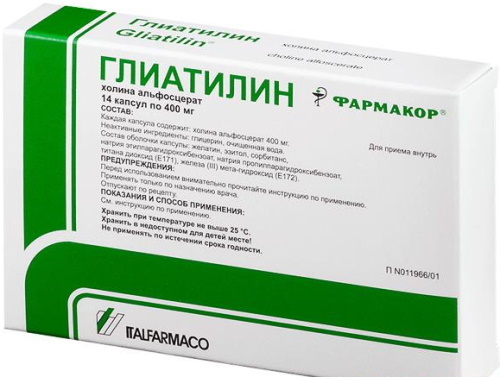
Unlike the main medication, the analogue has a significantly smaller number of side reactions, which is its main advantage. The disadvantage of the substitute is its high cost, which exceeds the cost of the original product.
According to expert reviews, the original medication has a more pronounced therapeutic effect. At the same time, the effectiveness and speed of action of the drugs are almost the same.
The analogue is more convenient to use, since it is available in the form of tablets for oral administration. The main agent is produced in the form of a lyophilisate, which creates additional difficulties in the manufacture and administration of the solution.
Both drugs are contraindicated during the carrying and feeding of a child, since there is no data on the safe use of drugs during these periods of time.
Also, a substitute is prohibited for use in childhood, since capsules can lead to serious disorders. The main remedy can be used in childhood, however, strictly under the supervision of a specialist. The generic is dispensed by prescription.
Noopept tablets
Cortexin (analogs in tablets have no less pronounced therapeutic effect) should be replaced by other means according to the indications and recommendations of the attending physician.
This substitute is also produced by a domestic drug manufacturer. Unlike the main remedy, the generic has a different active ingredient - noopept.
Both drugs have a similar mechanism of action and some overlap in recommendations for the appointment. In this case, the drugs belong to the same pharmacological group - neuroprotectors (nootropics).
Indications:
- disorders caused by traumatic brain injury;
- postcomotional state;
- encephalopathy of various origins;
- asthenic conditions;
- other disorders accompanied by intellectual dysfunction.
Dosing regimen: tablets are taken after eating. Therapy begins with taking 20 mg, divided into 2 equal parts - in the morning and in the evening. In case of good tolerance and good therapeutic effect, the dosage can be increased to 30 mg per day, divided into 3 equal parts.
It is not recommended to take the drug after 6 pm. The duration of therapy is from 1.5 to 3 months. A repeated course can be carried out after a break of 1 month.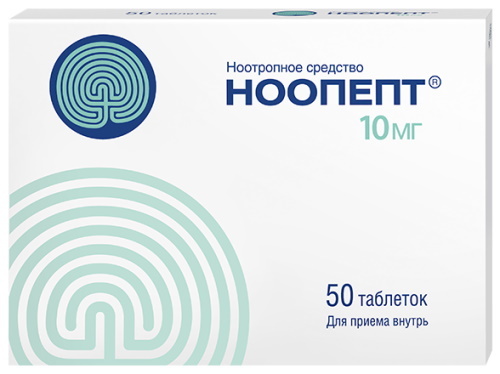
Both drugs have different contraindications, with the exception of pregnancy and lactation. Funds are not used during these periods. The substitute has more restrictions on its prescription, which significantly narrows the group of patients who can take it.
Contraindications:
- functional disorders of the kidneys and liver;
- period of gestation and breastfeeding;
- minor age;
- intolerance to the components;
- lack of lactase, hypersensitivity to lactose, glucose-galactose malabsorption syndrome.
Generic has fewer side effects compared to the original medication. The therapeutic effect of both drugs is identical, however, the speed of action of the main drug is higher, since the rate of absorption of active substances significantly exceeds the level of absorption of oral forms drug.
The big advantage of the analogue is its cost. It is significantly lower than that of the original drug. However, the cost of medicines is not a determining factor in their prescription or therapeutic efficacy. Terms of sale - prescription.
Ampoules Piracetam for children from 5 years old
Cortexin (analogs in tablets are prescribed in the absence of the possibility of using other dosage forms) can be replaced by other solutions similar in indications and action only with good tolerance components.
This medicine, like the main medicine, is manufactured at a domestic pharmaceutical plant. The analogue is produced in the form of a solution for intramuscular or intravenous administration.
The funds have different active ingredients. Thus, the active component of the analogue is the substance of the same name, piracetam. Both drugs belong to the same pharmacological group of nootropics and have similar recommendations for use. However, the substitute has much more of them, which significantly expands the scope of the solution and the group of patients.
Indications:
- impaired cognitive functions - decreased learning in children, memory impairment, dizziness, decreased concentration, emotional lability;
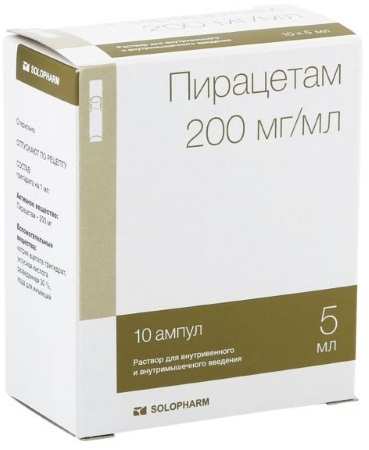
- dementia caused by traumatic brain injury, Alzheimer's disease, ischemic stroke;
- coma;
- withdrawal or psychoorganic syndrome associated with chronic alcoholism;
- Some forms of anemia (sickle cell form).
Scheme of use: at the beginning of therapy, 10 g of solution is prescribed per day. For patients with severe disorders, intravenous administration of the drug is indicated.
In this case, the daily dosage can be increased to 12 g. With a pronounced therapeutic effect, the dosage must be gradually reduced, after which the patient is transferred to oral forms of the drug. The duration of the course is calculated individually.
Both medicines have similar side effects. However, the original medicine has fewer restrictions on its intake. At the same time, a generic drug can be prescribed during pregnancy only taking into account the potential risks and expected benefits.
During lactation, the use of both drugs is prohibited, since the active components of both drugs can penetrate into the mother's milk and lead to different reactions in the child.
Contraindications:
- intolerance to the components that make up the drug;
- severe renal failure;
- hemorrhagic stroke.
The therapeutic efficacy of the original drug and its substitute is similar. According to reviews, the action of Piracetam occurs much faster. The big advantage of a generic drug is its cost, which is several times lower than that of the main drug. Dispensing method - prescription.
Phezam capsules
Fezam tablets are a combined medicine and are produced in Bulgaria. Unlike Cortexin, the substitute contains 2 active components - piracetam and cinnarizine.
Both drugs belong to the same pharmacological group of nootropic drugs and have a similar mechanism of action. However, a generic drug has more indications for use.
Indications:
- cerebral circulation disorders;
- toxic brain damage;
- disorders in the central nervous system, which are accompanied by memory impairments, decreased concentration, mood swings;
- the period after the transferred craniocerebral trauma;
- asthenia, which has a psychogenic nature of origin;
- psychoorganic syndrome;
- Meniere's disease;
- various forms of labyrinthopathies;
- migraines and headaches (as a preventive measure);
- poor learning ability in children due to the presence of a psychoorganic syndrome (as part of complex treatment).
Dosage regimen: 1-2 capsules 3 times a day. The duration of therapy varies from 1 to 3 months. It is recommended to take no more than 2-3 such courses per year.
Generic has a large number of side effects. With the original medication, such reactions are much less common.
The main disadvantage of the substitute is a large list of restrictions on the prescription, which, in turn, narrows the group of patients who can use the drug.
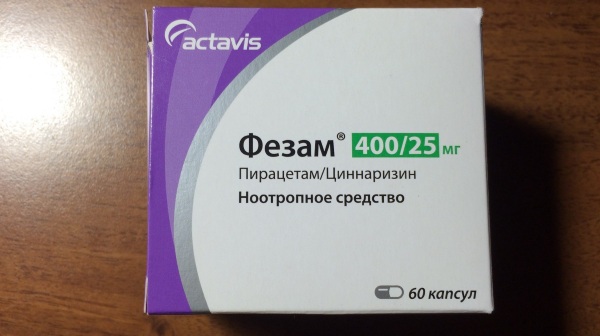
Contraindications:
- severe functional disorders of the kidneys and liver;
- stroke (hemorrhagic form of the disorder);
- increased excitability during the period of application of the drug;
- Huntington's syndrome;
- period of gestation and breastfeeding;
- children under 5 years of age;
- intolerance to the components that make up the medication;
- high sensitivity to galactose, lactase deficiency, glucose-galate malabsorption syndrome.
The analog also has additional restrictions when the drug is prescribed with extreme caution, and therapy is carried out under the strict supervision of a physician.
These conditions include the following violations:
- Parkinson's syndrome;
- intraocular pressure and disorders caused by this disorder;
- functional disorders of the kidneys and liver;
- hemostatic disorders;
- the presence of severe bleeding.
Both agents have a pronounced therapeutic effect and are well tolerated by patients. Terms of sale - prescription.
Encephabol suspension for children
Cortexin (analogs in tablets are more convenient to use) has several substitutes produced in the form of a suspension. One of these substitutes is Encephabol. The drug is manufactured in Austria and is intended for oral use.
Unlike the original drug, the analogue contains a different active ingredient - pyritinol. Medicines have one pharmacological group and similar recommendations for taking.
Indications:
- functional disorders of the brain, accompanied by appropriate symptoms - a decrease intellectual abilities, impaired memory and thinking, decreased concentration of attention, increased fatigue;
- cerebrovascular disorders;
- neuropsychiatric disorders - in pediatric practice.
Dosage regimen: adults are prescribed 2 hours. l. suspension 3 times a day. Newborn children are prescribed 1 ml 1 time per day for 1 month.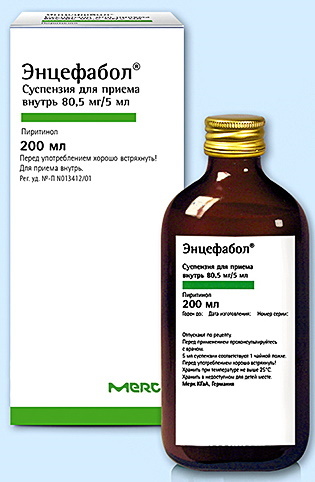
For children from 12 months, the recommended dosage is 0.5-1 tsp. l. from 1 to 3 times a day.
Children from 7 years old are shown for 0.5-2 hours. l. from 1 to 3 times a day. The duration of therapy in all cases should be from 2 months to six months.
The main disadvantage of a generic drug is an extensive list of side effects, the frequency of which is much higher than that of the main drug.
The substitute also has a more extensive list of application restrictions.
Contraindications:
- intolerance to the components that make up the suspension;
- chronic rheumatoid arthritis, in combination with the following pathologies: severe kidney and liver failure, blood diseases, autoimmune disorders;
- hypersensitivity to fructose;
- predisposition to the development of allergic reactions.
Unlike the main drug, the analog can be used during pregnancy and breastfeeding, but only with the permission of the doctor and taking into account the perceived risks and expected benefits.
The main advantage of the generic drug is the absence of any age restrictions, so it can be widely used in pediatric practice. Terms of sale - prescription.
Prices
Cortexin (analogs in tablets, as a rule, have a much lower cost) should be purchased only in specialized pharmaceutical stores or pharmacies.
The cost of funds may differ from each other depending on the dispensed dosage and the region or region of sale. The price of drugs is also influenced by a retail pharmacy chain that sells medical products.
Thus, the cost of Cortexin varies from 392 to 1655 rubles. The price of lyophilisate in a dosage of 5 mg in pharmacies in Moscow and the Moscow region is 392-1374 rubles, in a dosage of 10 mg - from 880 to 1655 rubles.
| Name of the drug | Price |
| Gliatilin (capsules) | RUB 500-3183 |
| Noopept (tablets) | RUB 321-572 |
| Piracetam (ampoules) | RUB 17-112 |
| Phezam (capsules) | RUB 240-540 |
| Encephabol (suspension) | RUB 805-1555 |
Before using Cortexin or its substitutes, you must first read the instructions for their use and consult a specialist. As a supplement, it is recommended to read the reviews of specialists and patients who used these drugs. You can find out the exact cost of pills at any pharmacy located in your place of residence.
Video about the analogues of Cortexin
Cerebrolysin and Cortexin:

